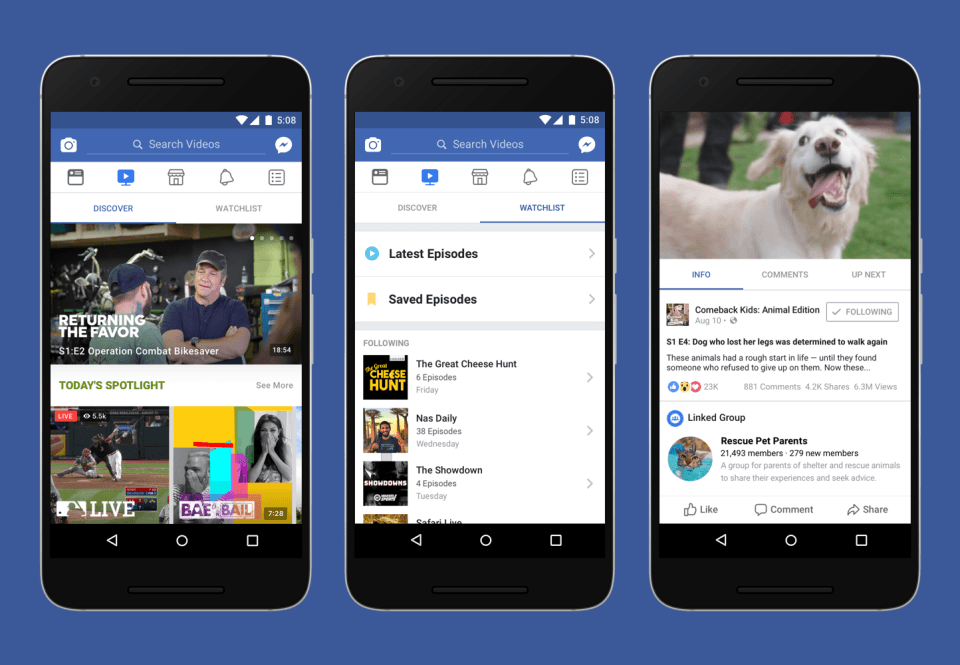Watch out YouTube
No, literally, Watch is out YouTube. Excuse the terrible joke, because for other video streaming platforms this could be no laughing matter if all goes to plan, which usually tends to be the case when you’re a digital behemoth like Facebook. Original video content has a new address and it looks it could be permanent. We’ll get into why and what that could mean for other sites but let’s start off by taking a closer look at why there’s so much hype surrounding the shiny new Facebook Watch.
Facebook Watch
Facebook Watch is – in their own words, “a platform for shows on Facebook” so it’s probably safe to assume that your beloved funny dog videos will remain in the news feed. It’ll be available on mobile, desktop and nested into the TV app, and similarly to Netflix and YouTube, Watch will be personalised to help you discover new shows based on your interests. Whilst it sounds cool, you’re probably thinking it’s no different to what we’ve already got. Well here’s where it gets interesting.
Naturally, Facebook have decided to harness their existing power and use it to create something unique. Despite coming into play fairly recently, ‘Reactions’ are a huge part of the social networking platform already, so it should come as no surprise that they’ll have a big role in Watch. You’ll find sections such as “What’s Making People Laugh”, full of videos where a large amount of people have used the “Haha” reaction. On top of that there’ll even be a “What Friends Are Watching” category. Best to keep it PG here then!
On who will be able to publish on Watch, Facebook have said this:
“We’ll be introducing Watch to a limited group of people in the U.S. and plan to bring the experience to more people soon. Similarly, we’ll be opening up Shows to a limited group of creators and plan to roll out to all soon.”
So whilst the list isn’t huge at the moment, it still includes some big names such as; Billboard who’ll be running “How it Went Down”, a documentary series of musicians sharing crazy stories and National Geographic with a series of live safaris led by their own guides.

Why could it be a problem?
You’d be correct in thinking they’re more of a concern for Netflix with big brands and influencers flocking to the platform to create exclusive series, but with the promise to roll out uploading power to all, it’s YouTube who might need to sleep with one eye open. But why exactly? Surely YouTube is of a size now where it will be fine regardless? Well that might not necessarily be true, due to a couple of reasons.
Growth Rate
In 2016, Facebook reported that over 100 million hours of video were watched on their platform every single day. Now whilst YouTube hit back reporting roughly 500 million hours per day, Facebook perhaps have the more impressive figure when you take into account the fact that YouTube is exclusively for video where as Facebook is not.
Discovery
Gone are the days of an audience finding a new creator thanks to a comment or a like. It still happens on occasion, but it’s a rarity. But how many hilarious (or just plain weird) memes have you found on Facebook thanks to someone you know tagging their mate? Discovery via interaction is a large part of the Facebook algorithm. That definitely gives it an edge.
Ad Revenue
If you follow any YouTubers we probably don’t need to tell you that ad revenue isn’t what it used to be. Whilst Facebook Watch will offer the same split, 55% for the creator and 45% in their own pockets, there seems to be far less restriction on the types of content that adverts appear over compared to YouTube. That is providing the in-stream adverts we saw before Watch was launched are a good point of reference.
YouTube or DramaTube?

This is having a huge impact on discovery but drama has become such a prominent part of YouTube now that we felt it needed its own section. If you haven’t got beef with another YouTuber, or collective if you’re looking for those big fat view counts, then you’re probably not what the current generation are looking for, sorry! Thankfully, a lot of great content still shines through. But it’ll be interesting to see if Facebook manage to survive without this bizarre trend.
For now, all we can do is sit back and wait to find out just how successful the platform is. But given the current desire to watch video content whilst browsing Facebook, the odds are certainly stacking in their favour.


